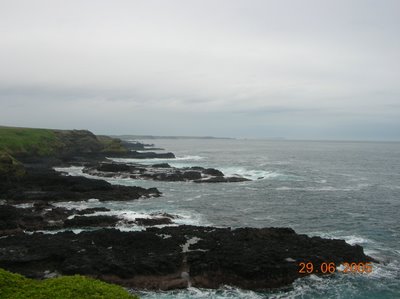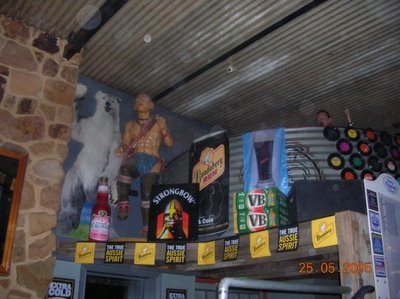
Thai Pig Skin Snack
3 good reasons for learning photo-editing
1) Look good (in photos)
Now, why spend your precious time airbrushing pics? (Don't you have something else better to do?)
Well, first of all, photo-editing is not a waste of time.
Apart from the feel good factor, having good artificially-enhanced photos will bring you the following perks:-
- free health supplements & skincare products (lipsticks, moisturizers, cleansers, facial masks, cranberry juice, spirulina sachets, bilberry extract… you name it!;-) lol)
- get paid being a freelance ad designer-cum-copywriter-cum-model
Yes:-) Give ad agencies a run for their money. As a freelancer, you have the cost advantage of working from home
- free facial & spa treatments
Ah… *winks, winks*
2) Duplicate old photos
Lost the film negatives of old photos? Don’t despair ;-) Create softcopy duplicates and enhance the images digitally.
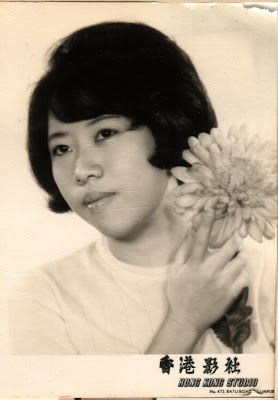
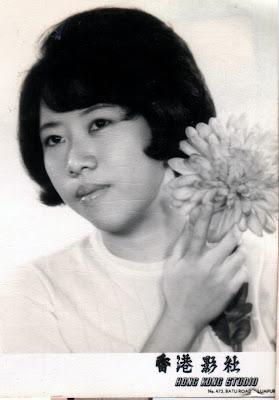
3) Make others look good & make money
In Asia, most wedding dinners feature powerpoint slides of the newlyweds’ photos (childhood photos, family photos, vacation pics,… etc). Well, make the brides happy by making them look good on that special day! ;-)

Above: a successful digital liposuction ;-)
Now, why spend your precious time airbrushing pics? (Don't you have something else better to do?)
Well, first of all, photo-editing is not a waste of time.
Apart from the feel good factor, having good artificially-enhanced photos will bring you the following perks:-
- free health supplements & skincare products (lipsticks, moisturizers, cleansers, facial masks, cranberry juice, spirulina sachets, bilberry extract… you name it!;-) lol)
- get paid being a freelance ad designer-cum-copywriter-cum-model
Yes:-) Give ad agencies a run for their money. As a freelancer, you have the cost advantage of working from home
- free facial & spa treatments
Ah… *winks, winks*
2) Duplicate old photos
Lost the film negatives of old photos? Don’t despair ;-) Create softcopy duplicates and enhance the images digitally.


3) Make others look good & make money
In Asia, most wedding dinners feature powerpoint slides of the newlyweds’ photos (childhood photos, family photos, vacation pics,… etc). Well, make the brides happy by making them look good on that special day! ;-)

Above: a successful digital liposuction ;-)
A Case Study of Wal-Mart in Japan: The Role of Culture in International Management
By Charmaine Chen We Lin, University of Ballarat
Executive Summary
With growth stalling in the United States in the early 2000s, Wal-Mart Stores Inc. is looking to international expansion for growth (Daniels et. al., 2007, p.298). Wal-Mart eyes for Japan - the second-largest and one of the wealthiest economies in the world, with a GDP of $3.15 trillion and per capita GDP of about $25,000 (Hodgetts et. al., 2006, p.229). Wal-Mart's business model is based on selling a wide variety of general merchandise and marketing, at “always low prices” (Wal-Mart, 2006). However, competition in the Japanese market is extremely tough and Wal-Mart finds that its strategies and business models, which worked in the United States and other countries, are not suitable in the Japanese market. Wal-Mart faces obstacles in replicating certain strategies – such as bypassing the intricate strings of distributors, trying to attract and convince Japanese customers that it offers good quality products at low prices, and implementing the “Smart System” (Wal-Mart’s in-store computer system). In order to survive in the Japanese market, there is a need for Wal-Mart to better understand the cultural nuances in Japan, in order to come up with more detailed, tailored and flexible approaches. This paper explores the important role of “culture” in international management by looking at Wal-Mart’s foray into the Japanese market – the successes and failures of its strategies.
1.0 Introduction
International expansion is a double-edged sword. Successful international business operations bring a great deal of profits to multinational corporations (MNCs). Failed international ventures, however, can be very costly. An important aspect that MNCs need to consider in international management is the role of “culture” – how culture affects the success of international expansion, and how it determines what can or cannot be done in international business. This paper first examines relevant case studies of international business operations, the background of Wal-Mart Stores Inc. and the meaning of culture as it applies to international management. This paper also looks at how differences between the “national culture” of Japan and the “organisational culture” of Wal-Mart Stores Inc. impact the performance of Wal-Mart in Japan, and affect the efficacy of its expansion strategies.
2.0 Literature review
A case study of several American fast-food franchises in Brazil by Risner (2001) found that success for the franchise brand is a result of “consumer acceptance” of the product, which is “determined by how strategically the company integrates itself into the habits and lifestyle of Brazil”. Winning the patronage of the Brazilian is achieved by marketing strategies “sensitive to their perceived needs of what is a unique and quality product offering[1]” (Risner, 2001, p.95). In Mexico, for instance, Wal-Mart uses the same trademark “everyday low price” strategy it uses in the United States (focusing on low, non-promotional prices and comparing its prices to those of the leading nearby competitors); but the retailer has also done “extensive local market research”, and as a result, Wal-Mart prices only the “most notable products” below those of its key competitors (Bartlett et. al., 2008, p.196). Sensitivity towards local culture is alson exemplified by J.C. Penney in its entry into the Brazilian market. J.C. Penney bought Lojas Renner; a family-run regional department store chain. But rather then turning Lojas Renner into just another J.C. Penney outpost, the company kept things local (McFarlin and Sweeney, 2006, p.291). By comparison, Wal-Mart (in Japan) seems to be less willing to project a local image or rely on local expertise when operating abroad. Critics suggest that Wal-Mart has a “headquarters knows best” mentality and “lacks sufficient international business experience in its top management ranks” (McFarlin and Sweeney, 2006, p.291).
3.0 Background of Wal-Mart Stores Inc.
[1] According to Risner (2001, p. 96), care must be taken when it comes to expanding abroad because for instance, although (in her study) Brazilians are fond of foreign products, a “foreign name brand does not instantly win customer loyalty”.
Life in Monash University, Gippsland campus
Glancing at your lecture notes as you take a stroll around the campus, the refreshing fragrance of the grass will tantalise your nostrils. Occasionally, you will be greeted by a curious flock of ducks or some quaint pink-headed parrot-like creature. Or, you may even be fortunate enough to catch a glimpse of the wild kangaroos.
 But, do bear in mind that you are in Monash University Gippsland – not a safari.
But, do bear in mind that you are in Monash University Gippsland – not a safari.So, while the lush greeneries and the richness of fauna in Gippsland make it a Mecca for nature enthusiasts, Monashians in Gippsland also have the privilege and comfort of extremely well-developed transportation and communication systems.
High-tech facilities minus the hustle and bustle of the cities contribute to the campus’ growing popularity among international students. Currently, international students represent 15-percent of the student population in the Gippsland campus.
“This gives a good dose of multiculturalism, but also ensures that international students have lots of opportunity to interact with Australians,” said Danielle Hartridge, Manager of the International Student Support Unit.
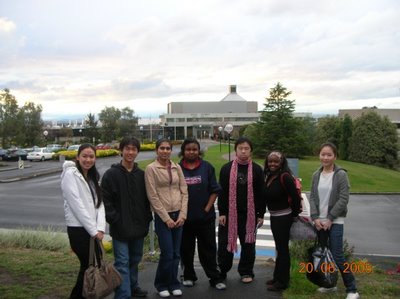
L to R: Tim, Wayne Tan, Nisha, Waithira, James, Catherine and Yi Ping (Eva)
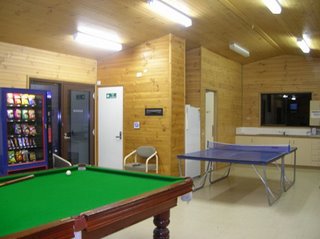 Recreation halls are equipped with audio visual facilities, air-conditioned computer labs, pool tables, and table tennis equipments
Recreation halls are equipped with audio visual facilities, air-conditioned computer labs, pool tables, and table tennis equipmentsThe great news is, exchange students are entitled to a 50 percent discount on all transportation fares in Victoria (Do I hear some gasps of delight?).
_________________________________
Student concession card:The good news is that, cardholders are entitled to a 50% discount on all public transportation fares in Victoria. The not-so-good news - well, only local students and exchange students can apply for this card
_________________________________While the V-Line trains operate every day, the LaTrobe Valley bus service does not run on Sundays. But, fret not, even if your dynamic personality requires you to travel several times daily. The costs of second-hand cars are relatively cheap.
“My friend’s second-hand car costs less than AUD$1,200 (RM3,360),” said Eva Cheng Yi Ping, a student from Hong Kong.
What a relief to know that the price of a Perodua Kancil can buy us more than 8 second-hand cars in Gippsland! A greater reason to jubilate is of course, the fact that we can easily get free rides from the local students who have got cars.

This is Matthew's car (the one that cost less than RM3,360, according to Eva). It's quite a decent-looking car, actually...

...before the accident, of course. By the way, I wasn't the culprit who disfigured the little red beauty.
“I don’t have a car. I don’t drive either. But I can always tag along whenever my friends go to MidValley or Traralgon Plaza,” said Eva.
Coincidentally, there is also a huge shopping centre by the name of MidValley in Gippsland, located 10 kilometres from the campus. MidValley houses big tenants such as Safeway and Big W (Carrefoure-equivalents), Target (a Tesco-sized clothes store) and DickSmith (twice the size of your regular SenHeng), as well as a discount store, a florist, several gift shops, clothes shops, CD stores… the list continues.
However, if a fast-shrinking budget requires you to scrimp and save on transportation fares and petrol expenses, shopping can always be done at the FoodWorks supermarket adjacent to the campus.
“It’s only about 60 to 300-metres walk from uni,” said Anthony Luke Begbie, who lives on-campus.
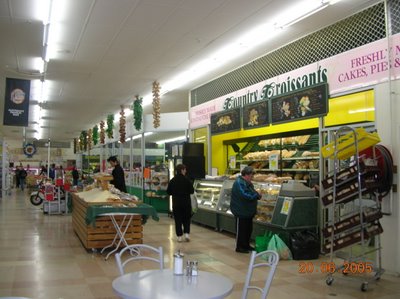
Manny's Market; my favourite:-)
Nevertheless, my favourite nook is still the Manny’s Market in Morwell town (approximately 9 kilometres from the campus). After all, who can resist the sight of juicy strawberries, sweet-smelling peaches, and the bewitching aroma of freshly baked loaves? Be it farmers produce, delicatessen or fresh meat, Manny’s Market offers the best in terms of price and variety.
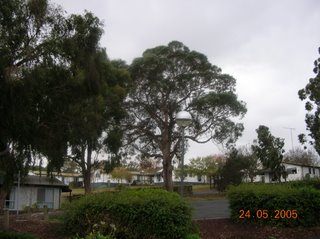
The chalet-like 'West Units' of the on-campus accommodation (This snapshot was taken from the window of my room in West House 6)
Besides convenient shopping, our needs for occasional doses of entertainment are also easily fulfilled. There is a bowling club, a go-karting entertainment park and a rose garden in Morwell, a sports and leisure centre in Churchill, chic nightclubs in Traralgon, a golf-course within the vicinity of the campus, free unlimited games of pool in the Student Union lounge and campus recreation halls, free weekly yoga and meditation classes organized by the Community Services Department, plus more than twenty clubs and societies in the Gippsland campus! 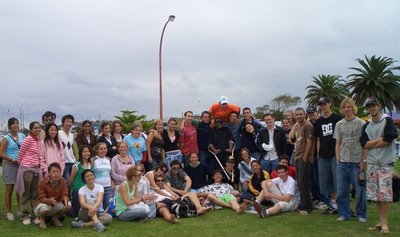
International and local students having a fabulous time at Cowwar Weir, a popular beach spot
The ISA (International Student’s Association), which caters to the welfare and entertainment needs of the international students, is one of the most active societies in the campus.“We in ISA always try our best to make the international students’ experiences here a memorable one,” explained Wayne Tan, Vice-President of the ISA.
“Whether you are a pizza-lover, movie addict, shopaholic or a ‘travel-holic’, ISA always have something in store for you,” Wayne said, mimicking the voice of a radio deejay.
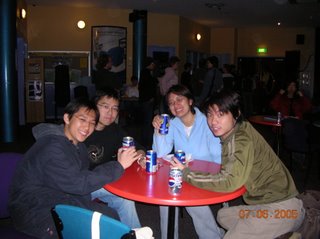
Wayne, James, May and Brandon having fun at the BBQ Party organised by the Gippsland Residential staff members
“We organize a ‘Movie Night’ with each release of a new movie. The tickets are partly subsidized by MUGSU (Monash University Gippsland Student Union),” he explained. “…there are parties and free food every now and then. Free pizzas, free Subway sandwiches, free Hungry Jack’s burgers, free barbeque, free three-course dinners …”
ISA also organize tours to local places such as the Fountain Gate, Dandenong Market, Queen Victoria Market, the Great Ocean Road, Mount Baw Baw, and the Phillip Island.
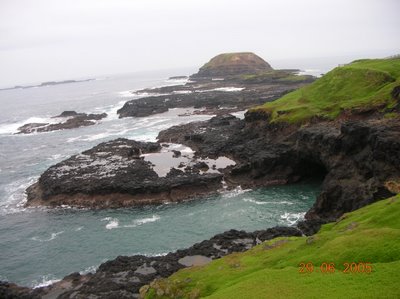
The famous "Blowhole" of the Phillip Island - awesome!
“I’ve had heaps of fun when I joined the Great Ocean Road tour earlier this year,” said Safinat Nisha, a first-year Bachelor of Social Welfare student from Fiji.
Subsidized by MUGSU, the two-day tour cost only AUD$50 (approximately RM140). The same tour would have cost more than AUD$200 (approximately RM560) at travel agencies.
Besides sponsoring ISA-organized activities, MUGSU also provides food vouchers to students who may be having a difficult time financially.
“We believe in taking care of students, not just academically, but socially and physically,” said Justin Kohlman, Monash University Gippsland’s Manager of Marketing.
But, do they also vaccinate us from homesickness? Well… they do, apparently.
“We have staff members who will happily get you involved and take your mind off your homeland with great new experiences in Gippsland,” said Danielle Hartridge.
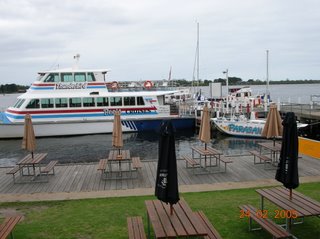
The Thunderbird boat cruise at Lakes Entrance (we saw dolphins!)
To keep the homesickness virus at bay, orientation weeks in Monash University Gippsland are always packed with fun-filled, educational and social activities – guest talks by representatives of VicRoads (for students who would like to find out more about driving in Victoria) and the Victorian Police, outdoor barbeques, farm visits, picnics at the Loy Yang Power Station and Cowwar Weir (a popular beachspot in Gippsland), boat cruise at the Lakes Entrance, cultural dinners, quizzes and games, and also the ‘Pyjama Breakfast’.

“Moving to a new country is a big challenge and so, our goal right from the time of orientation week is to get everyone involved, making sure everyone makes friends and feel at home here,” said Justin Kohlman.
So, how effectively is the issue of homesickness dealt with? Let us hear what the students have to say.
“I hardly feel homesick at all because we (the on-campus students) are provided with efficient Wireless LAN connection. I can video chat on MSN with my family and friends anytime, from the comfort of my room, or even while watching television in the common room,” said Law Yuk Li, who shares the same on-campus unit with five other students of different nationalities.
Likewise, I cannot remember being infected by bouts of homesickness.
“Of course, it’s normal to have the initial insecurities about being in a new place but…I fell in love with Gippsland the moment I set my foot here,” said Catherine Njeri, an exchange student from Monash South Africa, currently studying in Monash University Gippsland.
“I love almost everything about Gippsland,” she continued.
Well, is Gippsland really that perfect? Perhaps not…
“The parrots’ squawkings every morning can be rather annoying,” Catherine said, giggling. “I’ve never once missed my 9am classes, thanks to their morning calls.”
Another down side to being in Gippsland is that you will need to have at least the very minimum culinary skills of being able to handle a microwave, or be prepared to fork out AUD$6 (approximately RM17.50) for every meal.
My first experiment with the microwave nearly turned me into a suicide bomber. Attempting to bake a cake for a tea party, I placed an aluminium tin into a microwave, almost causing an explosion.
Undeterred by the aforementioned near-death experience, I have even coaxed my friends into drying our underwear in a microwave, which of course reduced the garments into unrecognizable bits of gooey, black substance. This happened when we were staying overnight at the Port Campbell lodging, while joining the MUGSU-organized Great Ocean Road tour.
“I love almost everything about Gippsland,” she continued.
Well, is Gippsland really that perfect? Perhaps not…
“The parrots’ squawkings every morning can be rather annoying,” Catherine said, giggling. “I’ve never once missed my 9am classes, thanks to their morning calls.”
Another down side to being in Gippsland is that you will need to have at least the very minimum culinary skills of being able to handle a microwave, or be prepared to fork out AUD$6 (approximately RM17.50) for every meal.
My first experiment with the microwave nearly turned me into a suicide bomber. Attempting to bake a cake for a tea party, I placed an aluminium tin into a microwave, almost causing an explosion.
Undeterred by the aforementioned near-death experience, I have even coaxed my friends into drying our underwear in a microwave, which of course reduced the garments into unrecognizable bits of gooey, black substance. This happened when we were staying overnight at the Port Campbell lodging, while joining the MUGSU-organized Great Ocean Road tour.
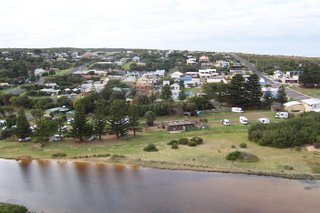
Great Ocean Road tour- a bird’s eye view of the picturesque Port Campbell town
Fortunately, the chances of similar mishaps in the Gippsland campus are almost nil, as all the on-campus housing units are equipped with clothes dryers.
So, are you now ready to embark on an adventure in Gippsland?
Beautiful Phillip Island
Subscribe to:
Posts (Atom)






















